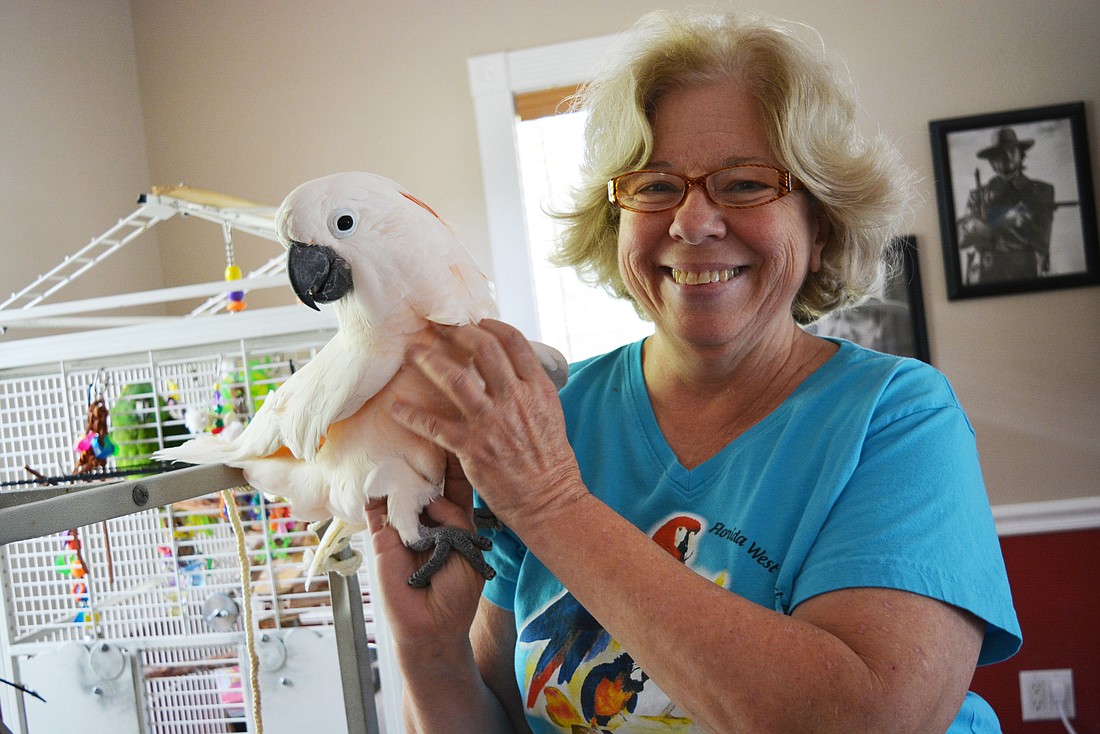- April 26, 2024
-
-
Loading

Loading

East County’s Gloria Schroeck doesn’t mind that her house might get a bit messy or that many of its baseboards have been gnawed like a bone.
It’s part of who she is and who she loves — her parrots.
There is Arnold, a yellow-naped Amazon she adopted in 1988 who she’s had the longest; Sweets, a blue-fronted Amazon; Tiko, a deformed turquoise Indian ringneck; Snorkel, a Timneh African grey; Miss Green, a yellow-naped Amazon; Dolly, a red-lored Amazon; and Sweet Tea, a Moluccan cockatoo.
She adopted Arnold, but the others were given to her. Sweet Tea, for example, came from neighbors when she lived in Sun City Center. After he destroyed a family computer, he was put outside on the porch alone to live in his cage without interaction or engagement. He screamed daily.
When Schroeck gave a home to Miss Green, she had been confined to her cage for six years. She was terrified of a rolled up newspaper — probably used to punish her by a previous owner — but she loved to sing songs.
“They’ve all got stories,” Schroeck said.
Schroeck is careful to spend time with each bird separately because parrots can become jealous.
“I have had parrots for almost 40 years,” Schroeck said. “I love and respect their intelligence. They are complex yet enchanting. Each one has a totally different personality from the others. They are much different than having a dog or a cat since they are not domesticated.”
Schroeck also enjoys her six cockatiels — Buddy, Bonnie, Coral, Charlie, George and Bing — who aren’t quite as needy but still love her attention.
“Having 13 is pure chaos, but it’s fun,” she said. “They have the intelligence and temperament of a toddler. The only difference is they will never grow up. Having them around keeps me young — and busy.”
Loving birds comes easily for Schroeck, but it can be very time-consuming.
She and other members of the Florida West Coast Avian Society hope to educate the public about birds and what’s needed to care for them properly. Parrots can live to be 30 to 80 years old, so they often require more than one owner during their lifetime, which makes long-term planning necessary.
“It’s a lifelong commitment,” fellow society member and Country Club at Lakewood Ranch Resident Cindy Gordon said. “It’s not a pet. It’s a companion.”
The nonprofit plans to use funds raised from the July 5 Music on Main toward its education and advocacy efforts. Members want to educate the public about the requirements of caring for parrots and about their longevity and intellect. They also want to help find replacement homes for birds whose owners can no longer care for them.
“There are so many birds and so few quality homes,” Gordon said.
Gordon said parrots have the intellect of a 5-year-old, so they need mental stimulation. Even simple things, such as providing wood to chew or toys to open, can help keep them stimulated.
“In the wild, they have to use their brains a lot for protection,” Schroeck said.
Without interaction, parrots can’t thrive, and then they typically exhibit behaviors that make their owners push them further away, Gordon said.
“If they don’t feel a sense of belonging, they can get depressed,” Gordon said. “They scream. They pluck their feathers. You have to understand the time commitment it takes to have a bond with them.”
Such requirements showcase why the society wants to help people understand what their birds need. Doing so will create better bird-human relationships, which results in happy birds and happy owners.